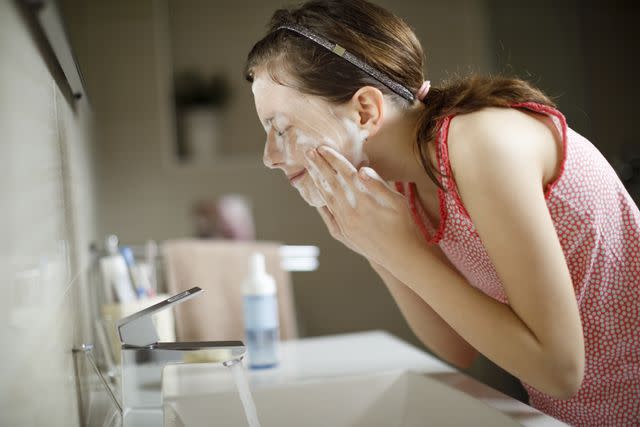How to Practice Acne Self-Care
Acne is common yet stressful, but self-care tips can help
Medically reviewed by William Truswell, MD
Acne is the most common chronic skin condition in the United States, affecting about 85% of teenagers. If you experience acne, you probably want to know how to clear it up. When you have pimples, self-care can help alleviate symptoms and clear acne-prone skin. It can also boost your self-esteem and help you cope with the emotional impacts of having acne.
Continue reading to learn more about acne vulgaris self-care and why it's important to develop a regimen that works for you.

damircudic
What Does Self-Care for Acne Mean?
"Self-care" is a word that gets tossed around a lot. So, it can be helpful to define what it means. According to the World Health Organization (WHO), self-care is the ability to “promote health, prevent disease, maintain health, and cope with illness and disability.”
Acne vulgaris self-care can include:
Developing a healthy skin care routine
Learning about your acne triggers and what contributes to flare-ups
Educating yourself about acne and how to make acne go away
Coping with the emotional distress that can be associated with acne
Building and maintaining your self confidence despite acne
Self-Care Techniques to Clear Acne
Having a hygiene and skin care routine can help prevent symptoms of acne and even help clear acne. Following these self-care steps can help keep your skin clear:
Wash your face in the morning and evening, plus after exercise. But don’t wash more than that, since doing so can dry out your skin and make acne worse.
Use a mild cleanser free from alcohol or oil.
Shampoo daily. This can prevent oil from your hair from getting into your face.
Remove your makeup daily with an oil-free remover.
Identify your triggers that make acne worse. These might include hormonal fluctuations associated with your menstrual cycle, certain foods, or numerous other things.
Get help for acne early. Work with your doctor if you notice that your pimples are getting worse or not responding to treatment.
Effect of Acne on Mental Health
Acne is a physical condition, but it can also impact your mental and emotional health. It might be helpful to remind yourself that you’re not alone. Even so, researchers have found that acne can increase your risk of:
Low self-esteem
Loneliness or social isolation
Overall, acne can make you feel like you’re not happy with your life. One of the best ways to prevent acne's mental impact is by getting treatment early. Whether you develop a skin care routine or work with a dermatologist to treat your acne, early intervention can prevent your symptoms from worsening with time. Therefore, it’s best to treat acne proactively before it takes a toll on your physical or mental health.
How Not to Practice Self-Care With Acne
Sometimes, the things you don’t do are just as important as the things you do to treat acne. When you’re practicing self-care with acne:
Do not pop pimples or pick at your skin. This can leave scarring that impacts your skin even after acne resolves.
Do not assume that acne is something you have to live with. Although acne is common, treatments and skin care routines can alleviate breakouts and pimples.
Do not think you have no control over acne. While acne often can't be avoided entirely, taking steps to avoid triggers and be proactive can help clear your skin.
Do not delay care. Without treatment, acne can get worse.
Do not blame yourself. Some people have worse acne than others, but having severe acne isn’t your fault.
Do not ignore the emotional side of acne. If pimples are impacting your self-confidence, social life or self-esteem, talk with a counselor. They can help you take care of your mental health, the same way that a dermatologist can help care for your skin.
Summary
Acne is a common skin condition that many people experience. While pimples may be a fact of life, acne has serious long-term health impacts that shouldn’t be ignored, including scaring and increased risk for depression, loneliness, and low self-esteem.
Practicing self-care for acne means establishing a hygiene and skin care routine that works for you. It can also include working with professionals—like dermatologists and mental health professionals—to ensure that you’re living your best possible life, even while managing acne.

